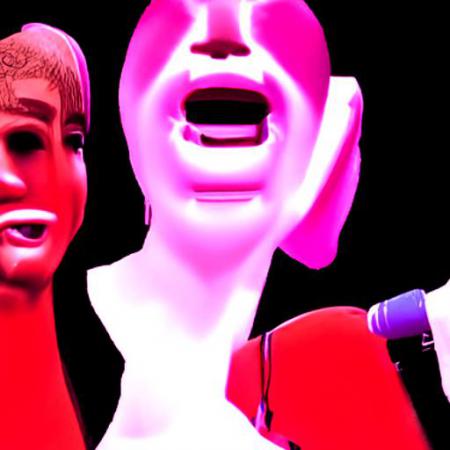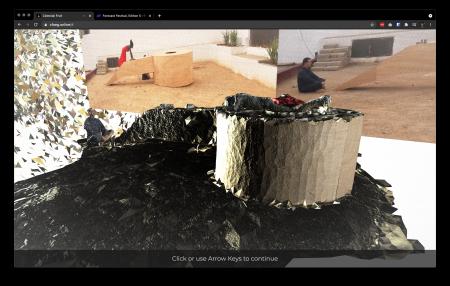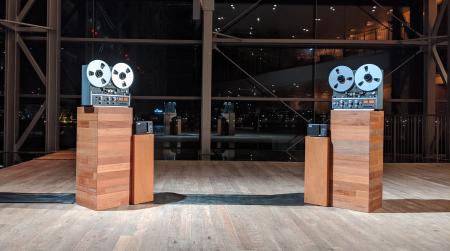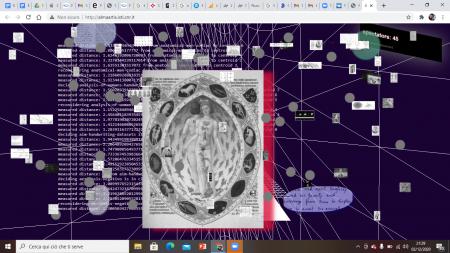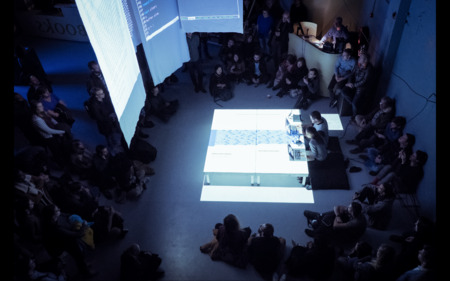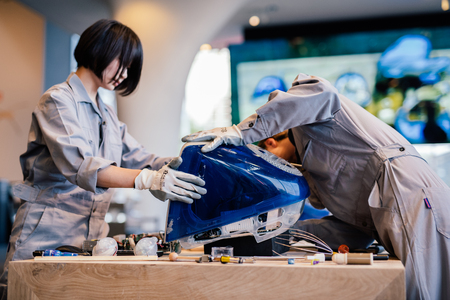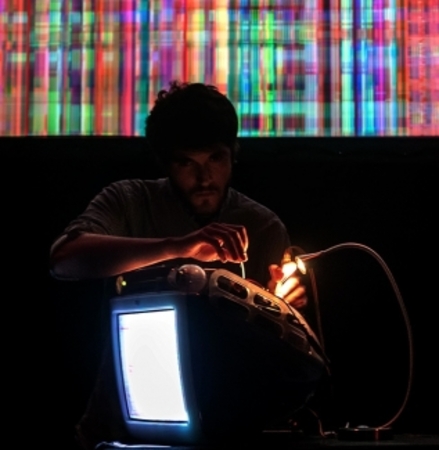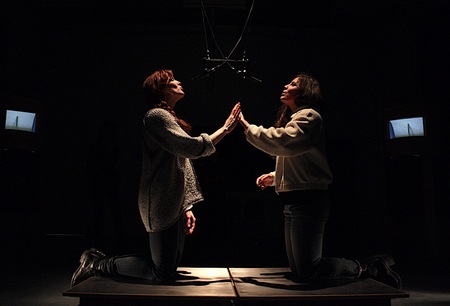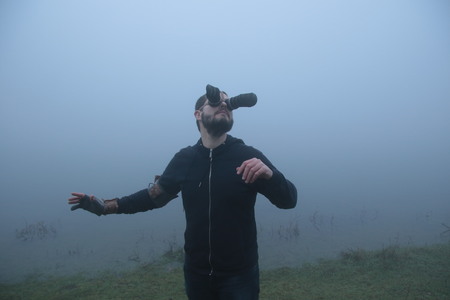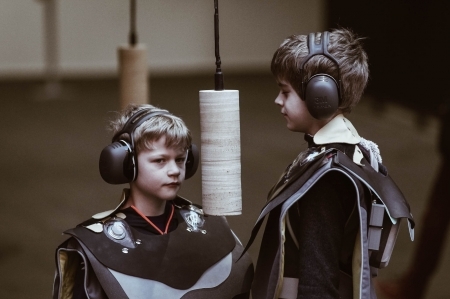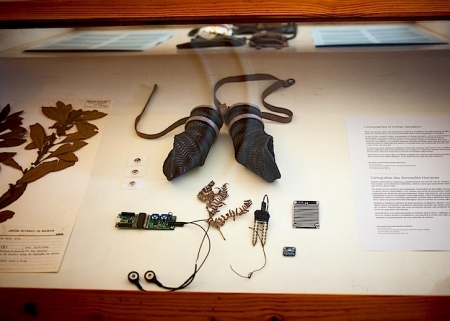-
info
In Search of Good Ancestors / Ahnen in Arbeit is a year-long experiment in generative radio commissioned by CTM Festival Berlin and Deutschlandfunk Kultur. An artificial BroadCaster, a bespoke voice synthesis system utilizing current deep learning techniques in voice synthesis and style transfer shifts through speech and song, words and soundscapes, reading through text as if tracing slowly over the letters, probing them and unsettling them. The broadcast begins modestly and develops throughout the year, intervened upon by a series of public workshops held with experimental publishing collective Varia, where participants collectively read, comment, and annotate the broadcaster’s predictions. This process of reparative reading, stewarding, and giving new reference points and expressive vocal abilities and personages to the broadcaster is in the interest of directing the algorithmic process towards one of many preferable futures, and to collectively work on building a machine learning system to include the presence of many individuals.
-
info
A hybrid digital/performance project exploring the cultural and geographical pathways of musical knowledge. Beginning with the American banjo family, and the oldest existing banjo of the Americas, the Surinamese “creole bania.” This becomes a starting point for seeking out a living network of musicians, instrument-makers, and tradition-bearers. The project has two parts, 1) live performance collaborations on-site, and 2) an interactive software experience, gathering traces of these exchanges as music, text, and objects in the physical world digitized remotely. The experience will express a layered and flexible concept of heritage that validates the role of online encounters, while also recognizing their fragmentation and acknowledging the need for interpersonal exchange in building respect for the cultural histories we are entangled in, both by circumstance and by choice.
-
info
A Conversation with Morton Feldman and Samuel Beckett at the End of History Two servers in a data center at the end of history attempt to create a conversation between Morton Feldman and Samuel Beckett that never occurred. Two text-to-speech artificial intelligence models were trained on a set of publicly available recordings of the voices of Beckett and Feldman, the former being notorious for his refusal to be recorded. The collected voice recordings of Beckett especially are sparse, leading the algorithms to create abstract sounds that capture the cadence and timbre of the voices of the two artists, but fails to produce comprehensible speech. The machine reproductions of the voices of Feldman and Beckett attempt to speak from a text corpus including over 500 Amazon.com user reviews of the collected musical works of Feldman, and the collected novels and plays of Samuel Beckett.
-
info
The "theatrical" peculiarity of this project (and the basis of the artistic residency) lies precisely in having shifted the attention from the pure visual concert on the stage, with the performers on the laptop clearly visible, as it was originally born, to the spectator who at a distance , it "moves" between "clusters" of information generated by the algorithm, creating its own path. More data generates "knowledge", but the information in turn attracts other information, the aggregation process does not seem to end and the network becomes potentially infinite (or rather, ever-expanding) like the world. During the navigation that involves all the senses, the invisible performers "play" improvising, the codes, in turn actors of this theater "from afar" while the "director" is undoubtedly precisely the algorithm that governs them and that in fact , is generating them on the spot. It would be interesting to explore a further level: that of user interaction with codes not only to explore the world of algorithm but to modify sounds and generate new environments.
-
info
A collaboration with Joana Chicau, following from a shared interest in livecoding and real-time algorithmic performance. We research and develop performative techniques for in-situ dissections of machine learning algorithms. To better understand the habitual and fixed objects of machine learning as well as their terminologies, and provide counter-techniques for conditions of emergence and movement. In our processual approach, we aim to develop an online repository of terminology and techniques for a critical examination of the “anatomy” of learning and prediction processes, data corpus and models of machine learning algorithms. And explore, through performance practice, how such a toolkit can confront the idealized bodies of artificial intelligence.
-
info
The Reading Room is an event series dedicated to creating a community-oriented, public platform for encounters with contemporary ideas on art and society. At its core, the Reading Room series revolves around the reading of texts provided by invited guests – cultural theorists, philosophers and curators – who join our diverse community in an open discussion while providing insight, context and perspective on the topics at hand. The series stems from a belief that keeping a close connection to historical and emerging theories on art and culture is invaluable to artists. Especially in the 21st century, where theory, practice and social engagement in the arts seem to merge ever more seamlessly. The Reading Room’s curatorial and organizational team is Sissel Marie Tonn, Jonathan Reus and Flora Reznik. The program is produced by the Instrument Inventors Initiative and, since 2016, is hosted by Stroom Den Haag.
-
info
A performance for two percussionists who musically and physically deconstruct a line of original iMac G3 computers from full functionality down to individual parts and materials over the course of a minimum of 2 hours. It aims to challenge the linear narrative of technological progress and sensitize the viewers to the materiality of electronic devices, while also hinting at the labor conditions of the assembly factories where these devices are made.
-
info
Using "vintage" iMac G3 computers as raw operating material, performers create a sonic and visual interpretation of the internal processes of the computer by hacking the electronics directly using fine-tipped sound amplifying probe instruments. An image of the computer desktop is projected, which takes on surreal and impressionistic qualities as malfunctions occur. Software routines are set into motion which translate into driving sonic polyrhythms, clicks and digital tones, as well as producing further visual dynamics within the failing and operationally confused system.
-
info
A choreographic instrument for audience participants or two dancers and an intra-body radio transmission system. The departure point of the performance is the evolution of touch understood from multiple cultural and historical vantage points, as inspired by sensory historian Constance Classen’s The Book of Touch. A set of Victorian radio-transmission apparatuses built from polished steel and the remains of a discarded piano are used as the “stage” for a dance choreography which moves fluidly between modes of touch from the ritual to the everyday, from sensual to violent and conciliatory. The apparatuses use abandoned “body-transmission” information technology system developed in the mid-90’s by researcher-scientist Thomas Zimmerman. Research into Zimmerman’s original designs and patents served as a reference point for creating the technology needed to realize the work. The apparatuses thus also tap into a never-to-be-realized techno-scientific sensory history, one envisioned by Zimmerman, where touch and information-telecommunication would be unified. The apparatus transmits acoustic signals gathered in the space through a localized body-channel radio system, through the dancers, from microphones to speakers placed in the space. The system creates a dynamic fluctuation of feedback loops, audible interference and acoustic resonances that directly reflect the movements of the dancers in relation to each other in the broadcast space above the platforms. The platforms are also presented as an interactive installation, whereby audience members interact with each other through sound, touch and movement when standing, sitting or interacting with the radio fields produced by the platforms.
-
info
The research institute Sensory Cartographies is an ongoing collaboration between myself and Sissel Marie Tonn. In this project we seek to explore extreme and information-rich sensory environments through the motions of biometric recordings. At the center of the project is the creation of worn instrumentations that attempt to address notions of collection, categorization and navigation from originating the in colonial “golden age” of botany, to the biometric measurement and monitoring technologies today.
-
info
The Intimate Earthquake Archive overlays the digital siesmic archive of the KNMI, marked by its specific modes of collection, with a tactile archive, one which can only be accessed through the body of the visitor through a specially designed wearable interface with embedded surface and bone conduction transducers. The artists have chosen 12 earthquakes of socio-political significance from the Groningen gas fields to be part of this sensory archive, and have transformed these data sets into vibratory compositions that move move across the skin similarly to how the earthquakes moved across the land, intended to inspire a ‘deep listening’ experience within the body.
-
info
The herbarium in Funchal holds a collection of preserved plant specimins and taxidermized animals dating back to the 16th century, and can be understood to be a fingerprint of the history of colonization and acclimatization of plant species from colonial travels that passed through the island. This exhibition places documentation of our own biometric data recorded while traversing some of the most radical climates of the island, in the cloud forests of the upper altitudes. We wished to trace a line from the Linnaean taxonomy system of the 18th century to contemporary smart devices and surveillance technologies, questioning the certainty that science can deliver ultimate truths about nature through collection and categorization. The project Sensory Cartographies is an ongoing collaboration between myself and Sissel Marie Tonn. In this project we seek to explore extreme and information-rich sensory environments through the motions of biometric recordings. At the center of the project is the creation of worn instrumentations that attempt to address notions of collection, categorization and navigation from originating the in colonial “golden age” of botany, to the biometric measurement and monitoring technologies today.
Websites
portfolio site
jchai.meInstrument Inventors Initiative
instrumentinventors.orgSensory Cartographies Research Platform
sensorycartographies.infoSocial media
Maakt deel uit van Kunstenaarsinitiatief / Collectief / Broedplaats
Instrument Inventors Initiative (iii), SeeLab Scheveningen
Platform
Platform for Thought In Motion
Lid van Beroeps- / Kunstenaarsvereniging
iii (Instrument Inventors Initiative)
Curriculum vitae
Opleidingen
-
Autodidact
-
2012 - 2014ArtScience MMUS/MFA Den Haag, Koninklijke Academie van Beeldende Kunsten Diploma behaald
-
2000 - 2005Digital Art and Science / Mathematics University of Florida Diploma behaald
tentoonstellingen
-
2020Words and Music Muziekgebouw aan 't Ij Amsterdam, Nederland Premier of new work "Wordless", that attempts to recreate an imaginary conversation between Samuel Beckett and Morton Feldman at the end of history. www.muziekgebouw.nl/agenda/themas/206/Words_Music_2020/ Groep
-
2020In Kepler's Gardens Ars Electronica Centre Linz, Oostenrijk Exhibition of The Intimate Earthquake Archive ars.electronica.art/keplersgardens/en/ Groep
-
2018Brace for Impact Stedelijk Museum Amsterdam, Nederland If this; then that. A 2 hour performance commissioned by De Appel for the atrium of the Stedelijk Museum. www.e-flux.com/announcements/181567/brace-for-impact/ Groep
-
2018Hyperobjects Ballroom Marfa Marfa, Verenigde Staten An exhibition exploring the concept of "Hyperobjects", a tool for confronting the overwhelming scale of today’s ecological crisis. Curated by Timothy Morton and Laura Copelin www.ballroommarfa.org/archive/event/hyperobjects/ Groep
-
2017transmediale 2017 House of World Cultures (HKW) Berlin, Duitsland Performer in and curator of the performance program "The Instrumental Subconscious", and "Algorave" transmediale.de/content/the-instrumental-subconscious Groep
-
2016In Praise of Shadows La Fabrique Nantes, Frankrijk Installation of "Telco Remains of the Pianist's Touch" as part of the exhibition In Praise of Shadows apo33.org/index.php/en/2016/07/12/exposition-iii-collective-in-praise-of-shadows/ Groep
-
2015Artefact Festival STUK kunstencentrum Leuven, België Large scale performance "iMac Music" in the teaching theatre of the historic STUK building archive.artefact-festival.be/2015/en/program/imac-music-2012.html Solo
-
2015In Praise of Shadows Sin Pin Pier Gallery Kaohsiung, Taiwan installation / In Praise of Shadows exhibition instrumentinventors.org/event/in-praise-of-shadows-in-taiwan/ Groep
-
2014The Future: failure/no failure, a dedication to Erkki Kurenniemi International Film Festival Rotterdam Rotterdam, Nederland An evening concert dedicated to the work of flamboyant Finnish futurist, inventor, experimental filmmaker and electronic music pioneer Erkki Kurenniemi. Performing on the exposed circuitry of obsolete waste computers, Jonathan Reus provides a brute alternative to computer music. Reus' torrents of glitched visuals, hard digital rhythms, and body-interfacing performances make a modern dystopian counterpart to Kurenniemi's optimistic vision of the human-machine condition. iffr.com/en/blog/mind-the-gap-nights-2014 Solo
projecten
-
2023
In Search of Good Ancestors / Ahnen in Arbeit Deutchlandfunk Kultur Berlin / Deutchlandfunk Kultur, Duitsland ahnen.in A year-long experiment in generative radio, investigating the nature of datasets and machine learning algorithms as unstable, intergenerational memory. A 24-hour broadcast on German Public Radio features the voice(s) of an artificial BroadCaster, a bespoke generative voice instrument utilizing deep learning text and speech models that begin pre-trained on widely used public research datasets. The BroadCaster mutates via trainings on small-scale datasets created collaboratively through a series of public workshops happening through the year. The Broadcast + Workshops navigates themes of long-term and intergenerational thinking – using as its seminal text American virologist Jonas Salk’s 1977 lecture “Are we being good ancestors?”. Here, Salk, a renowned altruist, calls for the cultures of “the West” to make intergenerational responsibility the highest moral imperative. Through the year the BroadCaster repeatedly attempts to extrapolate on this lecture, its predictions altered by the contributions of texts, stylistic annotations and voice recordings collected in the workshops. Thus, new vocal identities and poetic styles emerge in excess of the single voice, while those of the initial trainings decay over time through a process of “catastrophic forgetting” when being trained on a dataset whose diversity unfolds over time. The broadcast streams from January 2022 – February 2023 at ahnen.in, while fragments are played intermittently on German Public Radio until end of December 2022. The workshops’ activities were conceived in collaboration with artist-researcher Eleni Ikoniadou, and Angeliki Diakrousi, Joana Chicau, amy pickles and Cristina Cochior of VARIA. This work is commissioned by CTM Festival, Deutschlandfunk Kultur and ORF Ö1 Kunstradio, with additional support from the Leverhulme Trust.
-
2022
Anatomies of Intelligence V2 Rotterdam Rotterdam, Nederland anatomiesofintelligence.github.io/ Anatomies of Intelligence is an artistic research initiative seeking to make connections between the formats and collections of anatomical knowledge and investigations into the “anatomy” of computational learning and prediction processes, datasets and machine learning models.
-
2022
Sensory Cartographies Platform for Thought In Motion The Hague, Nederland sensorycartographies.info/ Sensory Cartographies is a collaboration between composer Jonathan Reus and artist-researcher Sissel Marie Tonn. The Sensory Cartographer seeks to explore extreme and information-rich environments; developing an understanding of these spaces through mediated forms of attention and mindfulness towards physiological, psychological and cognitive movements. We create wearable technologies and neuro-sensory attunement instruments that attempt to renegotiate techniques of cartography, collection, categorization and navigation originating the in colonial “golden age” of botany, drawing a line between these impulses to categorise nature to modern measurement and monitoring technologies.
-
2021
Celestial Fruit on Earthly Ground Forecast Platform, Berlin Online, Ghana cfoeg.land A hybrid digital/performance project exploring the cultural and geographical pathways of musical knowledge. Beginning with the American banjo family, and the oldest existing banjo of the Americas, the Surinamese “creole bania.” This becomes a starting point for seeking out a living network of musicians, instrument-makers, and tradition-bearers. The project has two parts, 1) live performance collaborations on-site, and 2) an interactive software experience, gathering traces of these exchanges as music, text, and objects in the physical world digitized remotely. The experience will express a layered and flexible concept of heritage that validates the role of online encounters, while also recognizing their fragmentation and acknowledging the need for interpersonal exchange in building respect for the cultural histories we are entangled in, both by circumstance and by choice.
-
2018
The Reading Room Stroom Den Haag The Hague, Nederland platformtm.tumblr.com/ The Reading Room is an event series dedicated to creating a community-oriented, public platform for encounters with contemporary ideas on art and society. At its core, the Reading Room series revolves around the reading of texts provided by invited guests – cultural theorists, philosophers and curators – who join our diverse community in an open discussion while providing insight, context and perspective on the topics at hand. The series stems from a belief that keeping a close connection to historical and emerging theories on art and culture is invaluable to artists. Especially in the 21st century, where theory, practice and social engagement in the arts seem to merge ever more seamlessly. The Reading Room’s curatorial and organizational team is Sissel Marie Tonn, Jonathan Reus and Flora Reznik. The program is produced by the Instrument Inventors Initiative and, since 2016, is hosted by Stroom Den Haag.
-
2014
Ogen/blik Het Nutshuis, Den Haag The Hague, Nederland Performance series / artist initiative showcasing surprising and unusual performance experiences for an audience.
Internationale uitwisselingen / Artist-in-residencies
-
2021perfocraze international artist residency Kumasi, Ghana www.crazinistartist.com/piar-artist-in-residency/
-
2016
-
2015
-
2013
-
2013
-
2011NK Projekt Berlin, Duitsland
opdrachten
-
2022In Search of Good Ancestors / Ahnen in Arbeit CTM Festival, Berlin Online, Duitsland A year-long experiment in generative radio commissioned by CTM Festival and Deutschlandfunk Kultur. An artificial BroadCaster, a bespoke voice synthesis system utilizing current deep learning techniques in voice synthesis and style transfer shifts through speech and song, words and soundscapes, reading through text as if tracing slowly over the letters, probing them and unsettling them. The *BroadCaster* performs words produced by a predictive process. Beginning with Jonas Salk’s essay “Are we being Good Ancestors?”, it tries to predict what words should come next based on its previous memories. Ideas of long-term thinking, wrapped up in human activities of prediction, risk analysis, and memory happen at many levels of human society and individual consciousness. How do we make decisions today, navigating the many layers of uncertainty about the long-term future we are a small part of? www.ctm-festival.de/festival-2022/programme/features/radio-lab/in-search-of-good-ancestors-ahnen-in-arbeit Uitgevoerd
-
2021hackingrhythm.online Slagwerk Den Haag Online, Nederland Hacking With Rhythm is a sonic research project into how sound and internet infrastructures intertwine to create music. The project's aim is to collect interventions by inquisitive composers and sound artists who challenge the concepts of what is an instrument and what is a stage. hackingrhythm.online Uitgevoerd
-
2020Wordless Asko/Schonberg Ensemble Amsterdam, Nederland commission for new installation jonathanreus.com/portfolio/wordless-a-conversation-with-morton-feldman-and-samuel-beckett-at-the-end-of-history/ Uitgevoerd
-
2018if this; then that De Appel, Amsterdam Amsterdam, Nederland commission for new performance jonathanreus.com/portfolio/if-this-then-that/ Uitgevoerd
publicaties
-
2020Algorithmic Segments Catalogus REAGENZ VERLAG Hanns Holger Rutz & David Pirrò Graz, Oostenrijk Algorithmic Segments is the catalog for a series of exhibitions and art events happening in Graz throughout 2020. In its gestational stages, the project was conceived as the consolidation of different simultaneous exhibitions across the city of Graz, within the framework of Kulturjahr 2020, a festival of initiatives in art and science on the topics of environment and climate, and digital life-worlds, social interaction, and the future of work.
-
2017Relay Conversations instrumentinventors.org Online publication
-
2014No Patent Pending: Self-made Performative Media MER Paper Kunsthalle Book
Prijzen en stipendia
-
2017Leuphana University award for cross-disciplinary teaching initiatives between art and science Leuphana University, Lüneburg DE
-
2017Talent Development Prize Creative Industries Fund, NL
-
2014Sonic Effect Seed Prize York University, Toronto, CA
-
2014Stroom Invest Grant Den Haag, NL
-
2009Fulbright Research Grant US Dept. of State, New York, USA
Vertegenwoordiging
-
--Instrument Inventors Initiative (iii) Den Haag, NL
artistieke nevenactiviteiten
-
2016 - 2018Curation / The Reading Room at Stroom Den Haag, NL
-
2015 - 2017Teaching - Institute for Culture and Aesthetics of Digital Media, Hamburg, DE
-
2014 - 2016Teaching - ArtEZ Academy for the Arts, Arnhem, NL
-
2012 - 2013Teaching - Hogeschool voor de Kunst, Utrecht, NL
-
2012 - 2013Teaching - Amsterdam Conservatory, Amsterdam, NL
-
2010 - 2013Curation / Artist Residencies - STEIM, Amsterdam, NL
